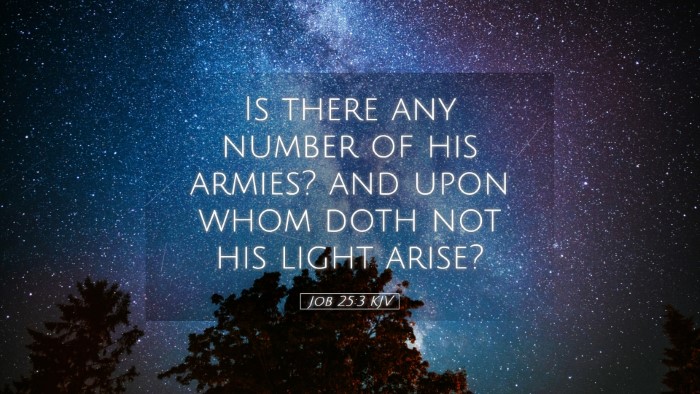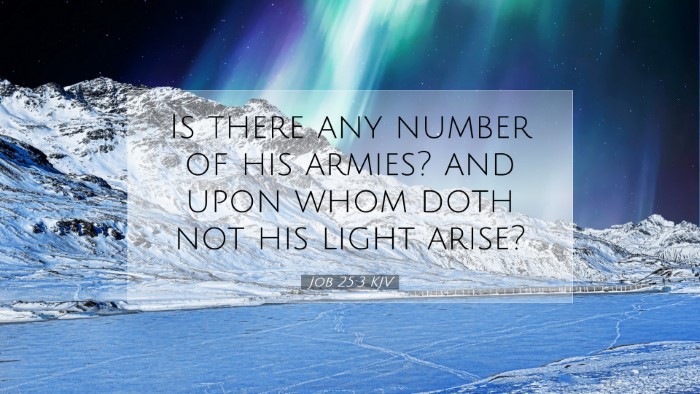Old Testament
Genesis Exodus Leviticus Numbers Deuteronomy Joshua Judges Ruth 1 Samuel 2 Samuel 1 Kings 2 Kings 1 Chronicles 2 Chronicles Ezra Nehemiah Esther Job Psalms Proverbs Ecclesiastes Song of Solomon Isaiah Jeremiah Lamentations Ezekiel Daniel Hosea Joel Amos Obadiah Jonah Micah Nahum Habakkuk Zephaniah Haggai Zechariah MalachiJob 25:3
Job 25:3 KJV
Is there any number of his armies? and upon whom doth not his light arise?
Job 25:3 Bible Commentary
Commentary on Job 25:3
Text of Job 25:3 (ESV): "Is there any number to his armies? Upon whom does his light not arise?"
Introduction
The verse Job 25:3, found in the dialogues of Job, presents profound theological implications concerning the majesty and omnipotence of God. It is essential to analyze this verse through the lens of various public domain commentaries to glean deeper understandings for pastors, students, theologians, and biblical scholars.
The Context of the Verse
Job 25 represents one of the final speeches by Bildad the Shuhite, one of Job's friends. In this segment, Bildad emphasizes the greatness of God while contrasting it with the frailty of humanity. This chapter serves as a response to Job's expressions of his struggles and the search for understanding regarding his suffering.
Insights from Public Domain Commentaries
Matthew Henry
According to Matthew Henry, Job 25:3 reflects the incomparability of God’s power and majesty. He notes that Bildad, while attempting to defend God’s justice, inadvertently makes a revelation about the limitations of human comprehension regarding the divine order. Henry emphasizes that God's "armies," interpreted as His angels or celestial beings, serve to illustrate the vastness of His dominion over creation. The rhetorical question posed implies that God's presence and authority extend beyond human grasp.
Albert Barnes
Albert Barnes provides a thorough examination of the rhetorical nature of Job 25:3. He observes that the phrase "upon whom does his light not arise?" points to God's omnipresence and His illuminating righteousness, which penetrates into every corner of the universe. Barnes emphasizes that the light of God serves both to reveal truth and to judge darkness, reinforcing the theme of divine judgment that permeates the book of Job. The reference to God's armies suggests a multitude of beings executed under His command, emphasizing His sovereignty.
Adam Clarke
Adam Clarke offers a unique interpretation by examining the phraseology in the original Hebrew. He argues that the term "armies" might be understood to encompass not only angels but also the natural forces of the universe, such as stars and planets, which are all under God's governance. Clarke’s insights provoke thought around the idea of God being the commander of all cosmic order, asserting that His sovereignty is both local and universal. Furthermore, he emphasizes the theological ramifications of God’s “light” as a metaphor for divine wisdom and purity, signifying that all of creation is subject to His authority and moral perfection.
Theological Implications
Understanding Divine Majesty
The myriad of interpretations on Job 25:3 strengthens the understanding of divine majesty. The imagery of armies and light opens discussions on God's omnipotence and how it relates to human limitations. It challenges readers to rethink their own understanding of God’s power and the human condition in the face of suffering.
God's Sovereignty and Human Response
This verse also invites reflection on the appropriate human response to such divine attributes. In the context of Job's suffering, understanding that God's light shines over all suggests that there is hope and order even in chaos. For pastors and theologians, this verse can serve as a pastoral tool to reassure those who suffer that God is indeed sovereign and present in their darkest hours.
Practical Applications
- For Pastors: Use this text to encourage congregants who may question God’s presence during times of hardship.
- For Students: Explore the implications of God’s omnipotence in biblical literature and its relevance to modern spiritual discourse.
- For Theologians: Engage in a deeper discourse regarding the nature of God as both transcendent and immanent in human experiences.
Conclusion
Job 25:3 is a succinct yet potent reminder of God’s infinite power and presence. Through the insights of Matthew Henry, Albert Barnes, and Adam Clarke, we gather a richer understanding of the theological depth within this verse. It challenges believers to confront the magnitude of God in light of their own limitations while encouraging an attitude of reverence and worship. The complexities of this verse continue to resonate across generations and enrich the faith experience.


